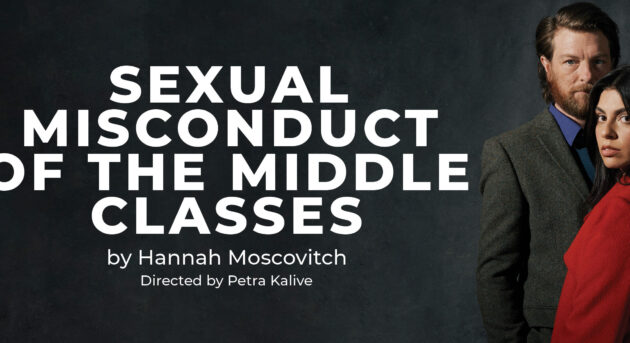Petra Kalive and Dan Spielman talk SEXUAL MISCONDUCT OF THE MIDDLE CLASSES
The first mainstage production for the Melbourne Theatre Company since pre-COVID, Sexual Misconduct of the Middle Classes tackles the archetypal student-teacher romance in a post-#MeToo society.
Prize-winning novelist Jon wants more out of his life than just teaching creative writing at a university. And then he meets Annie. Directed by MTC Associate Director Petra Kalive, and starring Dan Spielman and Izabella Yena, the play navigates the power dynamics of a complex situation with an even balance of humour, wit, and intelligence.

Petra Kalive has previously directed Hungry Ghosts, Melbourne Talam (Green Room Award-nominated Best Director), Beached and the Cybec Electric reading of In the Kingdom of Cha for the Company, and was Assistant Director on Constellations. Her acclaimed adaptation of Peter Goldsworthy’s novel, Three Dog Night, toured nationally in 2009. Her most recent work as a director includes the much-acclaimed Taxithi (Green Room Award-nominated Best Director), which, after two sell-out seasons at fortyfivedownstairs, went on to tour. Other credits include Mirror’s Edge, her own work Oil Babies at Northcote Town Hall (shortlisted for the NSW Premier’s Literary Awards), and the new musical by Dean Bryant and Mathew Frank, My Brilliant Career.
Dan Spielman is an acclaimed Australian actor, with past credits including Offspring, The Secret Life of Us, and The Code. He has won and been nominated for many industry awards including the Australian Film Institute Awards (now known as the AACTA Awards).
With the show opening this week, we chatted to Petra and Dan about their time working on the show.
How has it felt getting back into a theatre after last year?
Petra: I have loved getting back into the rehearsal room. I was so theatre-fit when Victoria locked-down; in the midst of directing The Winter’s Tale with the 2nd Year VCA students and had just finished directing a musical and was only a few weeks away from beginning Sexual Misconduct of the Middle Classes. It was a busy time and then everything changed – I was constantly oscillating between nothing and working furiously on digital projects – all the while finding it very hard to stay motivated while doom scrolling. So, I was a little apprehensive but incredibly excited about stepping into the rehearsal room. Had I forgotten how to do this? What was this? Why do we do this? How could I bring all that ‘stuff’ that I’d found and discovered in the swirl of lockdown into the room? And it was all those things. I think we had forgotten how to ‘be’ with people – so the first few days were exhausting as talked over one another (rather than waiting for the ‘zoom pause’) and constantly checked ourselves – however, we ultimately found our rhythm. And then suddenly it was Friday of the first week and I was a bit emotional about it all – so relieved to be back, with such an incredible team and generous room and telling this story at this particular time. I was breathing again.
Dan: Last year was an exceedingly difficult time for artists – being so deliberately excluded from support by the government, and not being protected by any employer. But artists are also accustomed to uncertainty and austerity in a way salary earners are not. It was a huge relief actually to not have to think about being available for work at all- the uncertainty had become a certainty in a way. Like most people however, the lockdowns resulted in a fresh take on priorities. Ultimately i feel very privileged to have a job at this moment – it fees like the world was shocked into clarity – and that is a great thing.
Why is this an important story to tell in 2021?
Petra: We are in the midst of a revolution, reviewing and redressing the power imbalances that have embedded themselves in our culture. It is no wonder then that a play like Sexual Misconduct of the Middle Classes finds its place on our stages. It explores the power dynamics between a professor (Jon) and his student (Annie) and the assumed and invisible lines that are crossed because of privilege, entitlement, celebrity and structural authority. What writer Hannah Moscovitch masterfully navigates is the thresholds crossed in a sexual relationship. Although Moscovitch explores power – the conversation about how this imbalance of power between men and women pervades our lives, exists on a spectrum – from the most horrific sexual violence to the more pedestrian, seemingly shrugged off ‘jokes’. The brilliance of Moscovitch is that she places this work towards the latter end of the spectrum, in the middle classes, right next door. The challenge in the work is to look in our own (suburban) backyards for the power imbalance that we unconsciously prop up.
Dan: It would be exploitative to link the current headlines with our work – the stories of the women who have come forward are their own. But there is a spectrum of behaviours that accompany abuses of power and I just think as disturbing and sad as it is – change is being called for on so many fronts. The theatre business is by no means exempt from the need for a conversation around abuse of power and misconduct. In this case the setting is a University.
Did the inclusion of an intimacy co-ordinator change the rehearsal process? If so, how?
Petra: The inclusion of an intimacy coordinator has not changed the rehearsal process in any significant way. It has provided a supported environment to realise intimate scenes. The intimacy sessions have included a framework and vocabulary to safely and effectively breakdown the actions and intentions of intimate moments. It has provided the actors with another person to talk to should intimate moments become triggering or they wish to talk with someone outside of the rehearsal room. It has been like working with a fight-director or choreographer – finding ways to best realise a particular moment in a scene with the support of an expert.
Dan: It’s the first time any of us had done this work!. It slowed things right down. Necessarily. There is much to say about that role and it’s development – but it was shocking to all of us that this basic language of consent had never been a part of our work before.
How have you both found working with restrictions and through lockdowns?
Petra: I think the 5-day lock down was the hardest as I was concerned we would lose momentum. But during the days we would have otherwise been in the rehearsal room, we touched-base on zoom and rehearsed scenes as best we could. Strangely enough it has been a time to consolidate and reflect on where we are and where we want to go. It has still meant that we have lost time from our rehearsal schedule, and it has put pressure on the whole team. While the support from the team at Melbourne Theatre Company is felt, we are definitely more isolated in our rehearsal room than usual. Working in our own little bubble. This is completely appropriate as we limit our interactions with others and therefore possible transmission, but it does feel strange to have so little contact with the broader company. I will be very happy when we can sit in a Production Meeting without wearing a mask. I don’t think I realized how much lip reading I do.
Dan: I personally found the time very inspiring.
Why should people come and see the show?
Petra: This is a show about now. It is meaningful and complex and funny. Hopefully it will surprise you.
Dan: Because, as Grace Tame said in her press club speech – we can’t fix a problem we don’t discuss. The theatre, however limited its reach, can present complex ideas in a safe space – and by its nature it welcomes reflection.
Sexual Misconduct of the Middle Classes opens Thursday 11th March.
Tickets and more information are available at mtc.com.au




